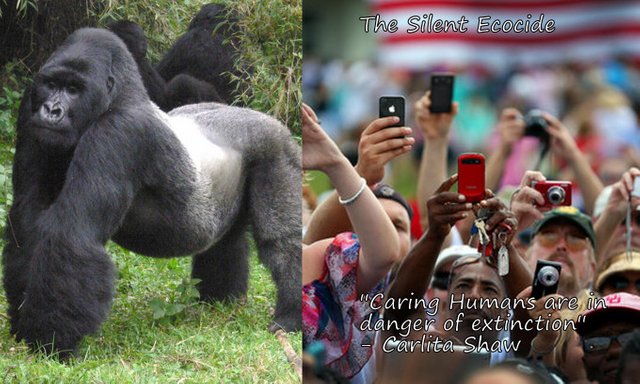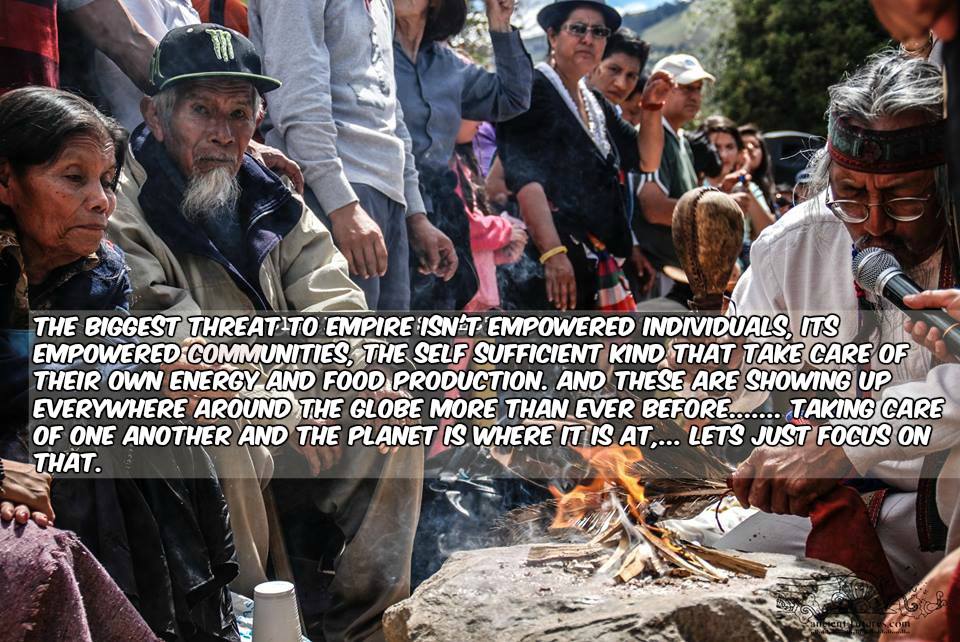Day of the Zombies-Black Friday

Consumer zombie- Courtesy of artist Aeryn James Davies, Ravanna
It is definitely a fundamental truth that ‘needing and having’ are the current basis of what drives Capitalism. While we approach Black Friday, the Westernised human being takes on the role of the programmed consumer, a creature that consumes material things and spews out plastic garbage and pollutants. In one year Americans produced 255 million tons of waste per year, filling landfill sites and oceans with islands of plastic the size of Texas. Out of that only 87 million tons of the waste gets recycled, that's about 34 percent.
U.S. crude oil extraction will reach 10 million barrels a day by 2018. Globally, oil production is at 3.5 billion barrels per day with politicians and their media puppets placing emphasis conveniently on emissions from vehicles and industries, rather than focusing on reducing the consumption of oil which is at a record breaking high. There is no excuse now to keep ignoring the Water Fuel cell car which Honda, Hyunda, Toyota and Genopax have already made available on the market. The problem is that the governments and corporations conveniently ignore clean fuel alternatives by either not giving people patents for the new technology or not financially supporting the infrastructure of new rechargeable stations for Waterfuel cell cars and other clean energy cars.
This is one reason why the Amazon rainforest will be non existent in 20 years as it disappears at a rate of 32 million acres per year as the oil under the soil is extracted. While could use water fuel cell cars, solar, electric or compressed air cars as alternatives. Governments pretend to be concerned, focusing on reducing carbon, with carbon tax, which makes them and their banks trillions of dollars out of taxing hot air. While, it's oil extraction that we need to stop immediately, so that the rainforests, where fifty percent of the world's biodiversity have a slim chance to survive, which contributes to keeping the Planet's biosphere in balance.
The world conception of this materialistic age is anthropocentric just where it should not be and not anthropocentric just where it should be. That is, it orientates the world by reference to man in matters where such orientation is nonsense, a nonsense deriving partly from vanity-and it does not orientate the world by reference to being of man in matters where being of man is, beyond all doubt, decisive and characteristic for the whole combined process of cosmic evolution.- Dr. Gunther Wachsmuth.
Governments have built values around material wealth, no value is placed on nature, a part from compartmentalization of blocks of greenery for aesthetics, nature is not valued for its necessary preservation of ecological wealth. Ecosystems are presently in collapse as a result of its undervalue and exploitation, despite the obvious fact that we must preserve nature and its life giving properties.
A few ecological entrepreneurs are beginning to open up plastic free food stores, to address the plastic waste problem, plastic is also a bi-product of the oil industry. Some environmentally conscious people are campaigning to bring new energy alternatives to the market to move away from fossil fuels, we now have the water fuel cell car and other cutting edge technologies available on the market, all that is required is for environmentalists to campaign for the infrastructure to evolve country to country to support these alternatives.
Another way to save the planet from ourselves is by putting financial value on ecological wealth, yet to some, this is an abstract concept in terms of human understanding of how much work and production goes on in the mechanisms of goods and services produced by ecosystems in nature. We pay no attention to it because we are so disconnected from observing nature. We don't think about the consequences of how much rubbish we generate each week or where that goes, if we treat the Earth like one big garbage disposal, its going to come back to us with severe consequences on the future of our lives and health as well as the future of the planet.
What we do, affects the mechanisms of nature or ecosystems. Our anthropogenic impact, the ramifications of how we choose to live has immediate effect on nature. The problem now is the ramifications have accumulated to a momentous scale, so that environmental scientists or ecologists have no time to measure anthropogenic pollutants efficiently on each ecosystem or species, though the signs point to warning signals of ecological collapse for the future of all species, where both plant and animal species are going extinct at a rate of 200 species per day, disappearing forever from this unique planet.
The environmental crisis is a crisis of human understanding, the outer manifestation of this destruction is an indication that we need to change. We are living in a time where we need to re-establish our lost connection with the Earth and having a caring empathic consciousness is the only thing that will save us.
"At a deep psychological level, convincing young people that they will get the respect, admiration, and love that they are looking for, through consumerism, is a manipulation of a deep human instinct to want to belong. Advertising and the media reinforce this message, in the process, destroying the community structures that provided people with the affirmation that they need. We have evolved in groups – deeply interdependent and connected – the separation and competition of the modern world is antithetical to our deepest needs." - Helena Norberg Hodge
Helena Norberg Hodge is an ecological pioneer and author of Ancient Futures, she studied with Noam Chomsky, Founder of the Society for Ecology and Culture and she believes that those running the global economy are imposing structural violence on our world.
Over the last 60 years, an ecological imbalance has emerged due to the monopolization of natural resources and energy. A monopoly that overlooks a need to create a more sustainably based economy within the bounds of the Earth’s natural carrying capacity. Centralised control of natural resources in the ‘free market’ causes imbalances such as socio-economic problems in the countries where these valuable natural resources are based. The result is deforestation, famine, privatized and inaccessible clean water, debt, homelessness and problems for local food growers and indigenous producers to access ancestral seeds.
How is it justifiable that a wealthier country has helped itself to local resources of developing countries, leaving the natives with nothing? We need to focus on localised sustainability, basically going back to the traditional ways of farming and managing local agricultural practices with holistic chemical free methods of cultivation.
People in the Western world produce the most waste and yet hold a lot of personal power by choosing ethically the products they buy, if people were more aware that their consumerism perpetuates injustices around the world in profound ways, then everyone would be more conscious about what they buy and who they buy it from. However, most people that live in privileged countries, rest on the poverty and injustice of slave continents such as Africa, parts of Central and South America and Asia for minerals, raw materials, fuel, cheap clothes and electrical goods.
Our over-reliance on technology is also driving this unfolding ecocide, the consumerism of electrical goods such as ipads, tablets and android phones all rely on a highly unethical mining industry that uses slave labour to mine and assemble electrical products in inhumane conditions; in addition to driving the destruction of the last cloud forests home of the highly endangered Silverback Gorilla populations in Africa. This is well illustrated by the story of the Silverback Gorillas in the African Congo. The mining of Gold, Diamonds and Coltan, (geological name - Columbite Tantalite), a mineral used in the microchips of every single new electronic device, cell phone or tablet and laptop, comes from the African Congo, in the Virungas National Park which is a UNESCO World Heritage Site. A biodiverse ecosystem where a small group of the world’s last pocket of remaining Silverback Gorillas which lend thanks to the work of Dian Fossey who was murdered on December the 26th 1985, because she was defending these primates which are critically threatened with extinction from poaching and a continually eroded habitat due to these existing ‘Conflict Minerals’ being extracted in the area, that the world is responsible for plundering.

The mineral Coltan can only be found in a few places in the world, one of which is in Australia, which was the world’s largest producer at Wodinga Tantalum mine in Western Australia, however they closed their mine in 2012 because it is cheaper to mine Coltan using slave labour in inhumane conditions in Africa’s Democratic Republic of Congo. To make matters worse for the Silverback Gorillas, the SOCO International energy company are pushing to extract gas and oil reserves from under Lake Edward in the National Park. All this, at the cost of one of the last greatest African forests and majestic Gorillas which have only been given an estimated 15 years of survival amidst the adversities they face through our lack of global responsibility to better manage conservation of critically endangered species, because minerals, gold, diamonds and oil are far more important to the world than saving the Silverback Gorillas and their forest home.
The fact that global mining companies can cut corners to make a bigger profit at the expense of an entire endangered species such as the Mountain Gorilla and at the expense of hard working African miners, who are slave labourers. This
shows that international environmental and human rights laws are far too flimsy and ineffective when the Western world conveniently lacks ethics in business which in turn perpetuates slavery, species extinction and ecocide. This is just one of many stories that illustrate the heavy price for the destructive consumer paradise of Capitalism in so called 'First World Nations'.
The current psychology behind what drives capitalism, cultivates a certain emptiness and spiritual deficit that leads to severe depression and lack of self-worth, when people feel that they have failed society and in society's view, have not achieved a desirable status. There's an element of not feeling useful to society or the community in the Western world if one is not successful financially. Last year in the UK at least 12 men under the age of 45 committed suicide in the UK per day, perhaps the numbers of those suffering from depression could be reduced if we shift our values from status, financial worth and material wealth to values that focus on connecting with each other in our local communities and with nature. Those that are waking up to this are choosing to adopt lifestyles that have a lower ecological footprint and allow having access to or creating community services and communal areas that include tending to nature and growing food, which provide a healthier sense of self worth and value, as human beings we need to feel a sense of belonging in our local communities, connecting with nature helps fill this void.
Depression is an indication that human consciousness needs to change, the current social environment does nothing to remedy depression, it does everything to cause mental illness and dysfunction. We need to change our psychological and status values in Western society to values that have more depth and meaning for the human spirit. An ecological economy would influence and cultivate healthier values for individuals as well as stronger communities, people could cultivate a self-worth that can be attributed to feeling part of a community and caring for the environment, values not based on status, power or on consumerist needs and wants that are never deeply fulfilling.

We are not robots, and we are not machines, we are human beings that have lost our humanity in the distraction of false value systems. Being in nature, being creative, painting, writing, singing, and making things; developing projects that could contribute to a better and more harmonious world, playing music or getting involved in a community project or doing something that aids deep relaxation, meditation or trance, all of these things can help bring feelings of deeper fulfilment and bring us more into the moment, reconnecting us with the joy that comes from just being and connecting with others on a deeper level. Reaching out as much as possible to friends and family, without feeling humiliated or the stigma that is carried with the label 'depression' and the negative stigma that go with it such as the words ‘mental illness or mental disease’. Inner work is really important for all of us, not just those of us suffering from depression, but those of us suffering from denial which seems to be the greater problem in human society.
William Manson explains that in 1968, Erich Fromm prophesied "The year 2000, might be the beginning of a period in which man ceases to be human and becomes transformed into an unthinking and unfeeling machine”. -In the context of a prevailing dehuman syndrome, spontaneous human expression becomes pathologised: Being open in speech; being unashamed of one’s body; relating to nature; hugging, touching, feeling and making love with other people; refusing to serve in the army and kill; and becoming less dependent on machines are generally considered ‘disturbed behaviour’ by a society of robopaths”. Of course, behavioural modification is facilitated through ideological training, expanding law enforcement, and emotional anaesthesia (psychopharmacology). In my view, revitalisation of one’s desiccated human-ness first and foremost requires a renewed contact with the web of evolved life, with Walt Whitman’s ‘primal sanity of nature’. Transcending the blinkered, bourgeois-utilitarian (mechanistic-industrial) world-view, one can embark on a purification of consciousness, a purging of the detritus of cultural pollution (and a recovery of emotional innocence). Withdrawing from the world of urban commerce (and its mind-numbing “messages”), one severs the flow of media propaganda and ceaseless “information” (relating to the ubiquitous ‘buying and selling’). Compulsive ‘having’ is the pathology of deficient ‘being.’ Aesthetic simplicity means disconnecting from repulsive superfluity. Seeking sanctuary in wilderness surroundings, one rediscovers the gentler rhythms of low-cost rural living: walking instead of driving, and prevention of disease through a style of living consonant with ecological wisdom.’’.
by
Carlita Shaw
Ecologist and Author
The Silent Ecocide